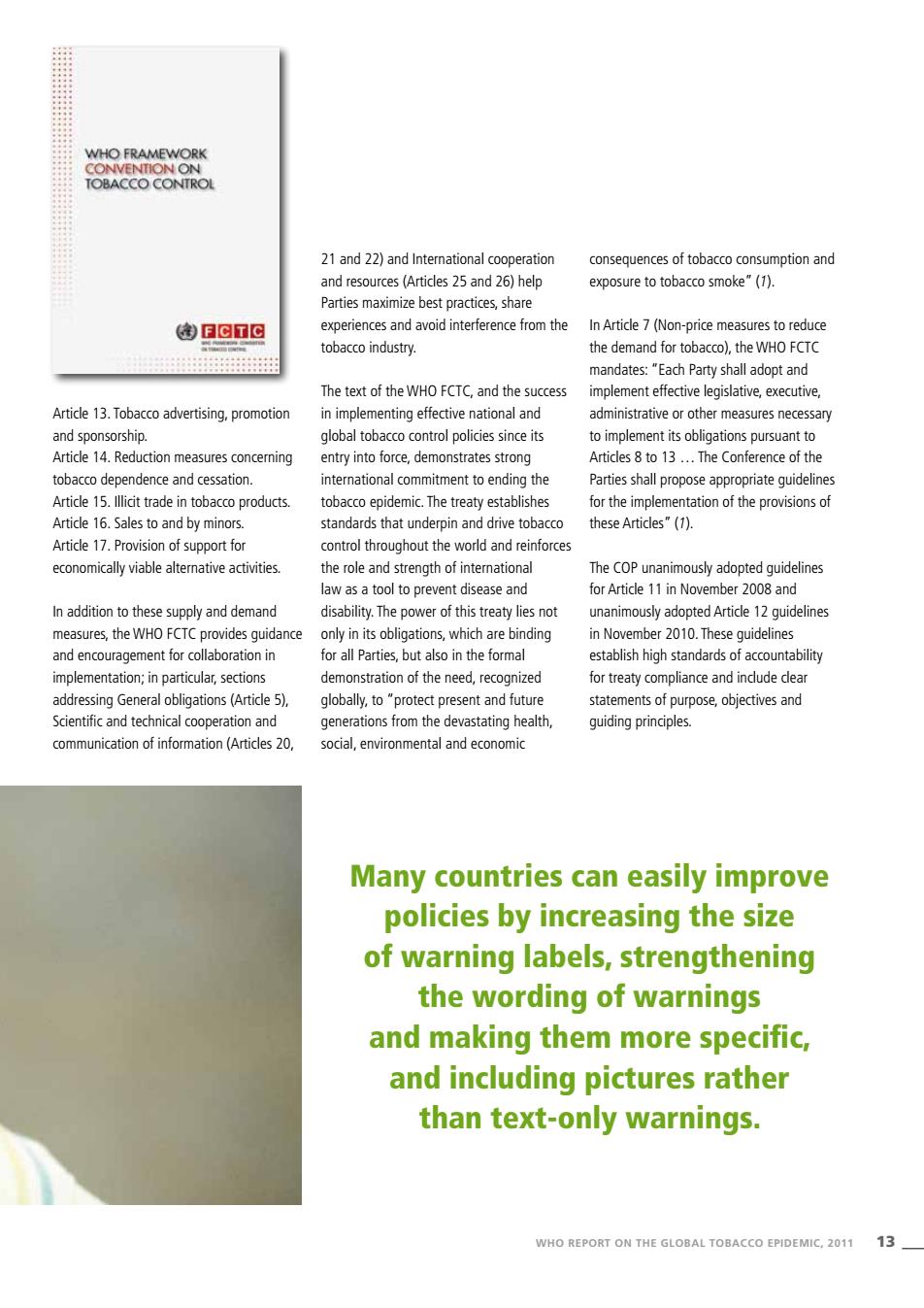正在加载图片...

WHO FRAMEWORK CONVENTION ON TOBACCO CONTROL 21 and 22)and International cooperation consequences of tobacco consumption and and resources(Articles 25 and 26)help exposure to tobacco smoke"(1). Parties maximize best practices,share 圈EgTg experiences and avoid interference from the In Article 7(Non-price measures to reduce tobacco industry. the demand for tobacco),the WHO FCTC mandates:"Each Party shall adopt and The text of the WHO FCTC,and the success implement effective legislative,executive, Article 13.Tobacco advertising,promotion in implementing effective national and administrative or other measures necessary and sponsorship. global tobacco control policies since its to implement its obligations pursuant to Article 14.Reduction measures concerning entry into force,demonstrates strong Articles 8 to 13...The Conference of the tobacco dependence and cessation. international commitment to ending the Parties shall propose appropriate guidelines Article 15.Illicit trade in tobacco products. tobacco epidemic.The treaty establishes for the implementation of the provisions of Article 16.Sales to and by minors. standards that underpin and drive tobacco these Articles"(1). Article 17.Provision of support for control throughout the world and reinforces economically viable alternative activities. the role and strength of international The COP unanimously adopted quidelines law as a tool to prevent disease and for Article 11 in November 2008 and In addition to these supply and demand disability.The power of this treaty lies not unanimously adopted Article 12 guidelines measures,the WHO FCTC provides guidance only in its obligations,which are binding in November 2010.These guidelines and encouragement for collaboration in for all Parties,but also in the formal establish high standards of accountability implementation;in particular,sections demonstration of the need,recognized for treaty compliance and indude dear addressing General obligations(Article 5). globally,to "protect present and future statements of purpose,objectives and Scientific and technical cooperation and generations from the devastating health, guiding principles. communication of information(Articles 20, social,environmental and economic Many countries can easily improve policies by increasing the size of warning labels,strengthening the wording of warnings and making them more specific, and including pictures rather than text-only warnings. WHO REPORT ON THE GLOBAL TOBACCO EPIDEMIC,2011 13WHO REPORT ON THE GLOBAL TOBACCO EPIDEMIC, 2011 13 Many countries can easily improve policies by increasing the size of warning labels, strengthening the wording of warnings and making them more specific, and including pictures rather than text-only warnings. Article 13. Tobacco advertising, promotion and sponsorship. Article 14. Reduction measures concerning tobacco dependence and cessation. Article 15. Illicit trade in tobacco products. Article 16. Sales to and by minors. Article 17. Provision of support for economically viable alternative activities. In addition to these supply and demand measures, the WHO FCTC provides guidance and encouragement for collaboration in implementation; in particular, sections addressing General obligations (Article 5), Scientific and technical cooperation and communication of information (Articles 20, 21 and 22) and International cooperation and resources (Articles 25 and 26) help Parties maximize best practices, share experiences and avoid interference from the tobacco industry. The text of the WHO FCTC, and the success in implementing effective national and global tobacco control policies since its entry into force, demonstrates strong international commitment to ending the tobacco epidemic. The treaty establishes standards that underpin and drive tobacco control throughout the world and reinforces the role and strength of international law as a tool to prevent disease and disability. The power of this treaty lies not only in its obligations, which are binding for all Parties, but also in the formal demonstration of the need, recognized globally, to “protect present and future generations from the devastating health, social, environmental and economic consequences of tobacco consumption and exposure to tobacco smoke” (1). In Article 7 (Non-price measures to reduce the demand for tobacco), the WHO FCTC mandates: “Each Party shall adopt and implement effective legislative, executive, administrative or other measures necessary to implement its obligations pursuant to Articles 8 to 13 … The Conference of the Parties shall propose appropriate guidelines for the implementation of the provisions of these Articles” (1). The COP unanimously adopted guidelines for Article 11 in November 2008 and unanimously adopted Article 12 guidelines in November 2010. These guidelines establish high standards of accountability for treaty compliance and include clear statements of purpose, objectives and guiding principles